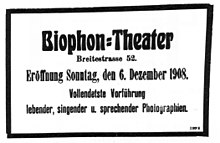Schauburg (Lübeck)
The Schauburg was an early Lübeck cinema .
Biophone
The Lübeck privateer Heinrich August Beuthien (born March 9, 1860 in Travemünde , † January 4, 1951 in Lübeck), a wealthy former restaurateur , spontaneously decided in 1908 to open a movie theater. For this purpose he had the first floor of the house at Breite Strasse 52, which he had acquired in December 1907, converted into a cinema. The technical equipment was taken over by the company Oskar Messters , after whose biophone - a device in which a motorized film projector was coupled with a gramophone , which allowed a synchronous sound accompaniment of short films - the cinema was named Biophon .
The opening of the Biophons took place on 6 December 1908. The cinema with 300 seats, where the family 's two sons Beuthiens as a projectionist who worked and his daughter worked at the box office - quickly became a popular movie theater with fixed core audience. Since the programs were still very similar in the early days of the cinemas, Beuthien attached great importance to showing films that stood out from the offerings of the other houses and could not be seen anywhere else in the city. He underlines this with the advertising slogan Nur im Biophon, which has been used in his advertisements for many years .
Schauburg
In the summer of 1926, Beuthien had the cinema, which was still popular, but now considerably too small and technically outdated, completely rebuilt. The hall was considerably enlarged and after the modernization it had 900 seats. Beuthien had Ervin Bossányi draw up the drafts for the artistic design of the rooms . On August 31, the reopening took place under the new name Schauburg , which was supposed to express dignified rusticity.

In 1929 the Schauburg was one of the two Lübeck cinemas, along with the UT-Lichtspiele , which were the first to be equipped with sound film equipment from various systems. There were public disputes between Beuthien and the operators of the UT-Lichtspiele over the question of which of the two cinemas had the preferred sound film system.
Until the beginning of the 1930s , the Schauburg was a purely family business in which Beuthien's wife, daughter, sons and their wives were employed; only then were further employees taken on.
During the British bombing raid on 28/29. March 1942 , which destroyed large parts of the historic Lübeck old town, the Schauburg was completely destroyed. After the war, reconstruction was initially considered, but not implemented. Heinrich August Beuthien, now very old, withdrew from business life; his children sold the property on Breiten Strasse and had the Schauburg finally deleted from the commercial register in 1956 .
See also
literature
- Petra Schaper: Cinemas in Lübeck . Verlag Graphische Werkstätten GmbH, Lübeck 1987. ISBN 3-925402-35-7
